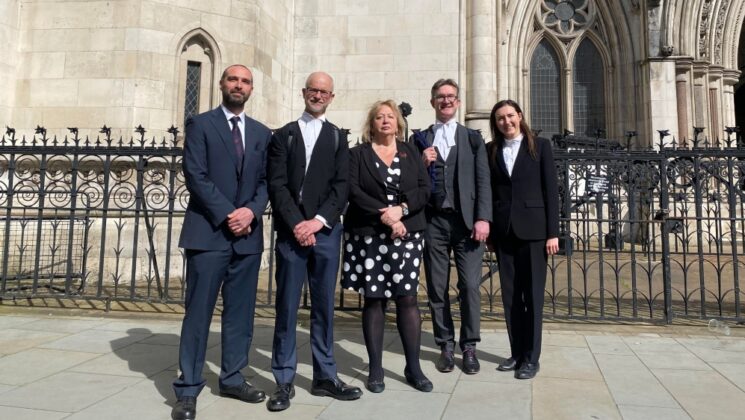General Secretary Christina McAnea (centre) with UNISON’s legal team outside the High Court this week
UNISON is challenging the government this week over regulations that allow employers to hire agency staff to replace striking workers.
Alongside the NASUWT and TUC, whose case is on behalf of eleven unions, UNISON asks that the High Court declares the government’s removal of regulation on agency workers unlawful. Together, the unions represent millions of workers in the UK.
Since 1976, it has been illegal for employers to introduce or supply agency workers to replace workers who are taking part in a strike or industrial action.
However, in the heat of last summer’s rail strikes, then Secretary of State Kwasi Kwarteng rapidly removed this regulation without consulting trade unions.
Since July 2022, agencies have been permitted to supply temporary workers to replace striking workers.
UNISON, the TUC and NASUWT argue that this is unlawful on two grounds: firstly, that trade unions were not fairly consulted by the government on these measures. Secondly, that the removal of this regulation amounts to an unlawful interference with workers’ right to strike.
Change without consultation
The Conservative government’s intention to allow employers to undermine strikes with agency workers was first included in their 2015 manifesto, with a declaration to “repeal nonsensical restrictions banning employers from hiring agency staff to provide essential cover during strikes”.
In 2015, the government ran a consultation on proposals to remove the regulation on replacing striking workers with agency workers, but did not progress the proposal.
It was not until 2022 – two governments later and no further mention of regulating strikes in subsequent manifestos – that the government decided to remove agency workers regulations without consulting unions. By that time, all unions faced significant limits to taking industrial action due to the Trade Union Act 2016.
The government claims that the 2015 consultation is sufficient, despite multiple new governments and major changes in the labour market since Brexit, COVID-19 and the cost of living crisis.
Representing UNISON, Michael Ford KC said a “reliance on seven-year old consultation is so unfair as to be unlawful.”
In her witness statement, UNISON general secretary Christina McAnea described how “ever since the financial crisis in 2008, the pay of our members has not kept pace with inflation, and it is this which is generating greater calls for industrial action.”
Ms McAnea also described the significant negative impact of the Trade Union Act 2016 on the union’s ability to take strike action.
Protecting the right to strike
The right to strike and engage in collective bargaining falls within article 11 of the European Convention on Human Rights, which is enshrined in UK law by the Human Rights Act.
UNISON told the judge in a written case outline: “The replacement of strikers by agency labour has the potential to have a chilling effect, or render the right to strike illusory”.
Given that taking strike action is such a core area of trade union activity, the unions believe that restrictions on the right to strike amount to a violation of article 11 ECHR.
The union also stated that the use of agency workers “defeats the very purpose of a strike, which is to place economic pressure on an employer.”
The case was heard this week at the Royal Courts of Justice. Mr Justice Linden has reserved judgment and is expected to make a decision on the case within the next month.






